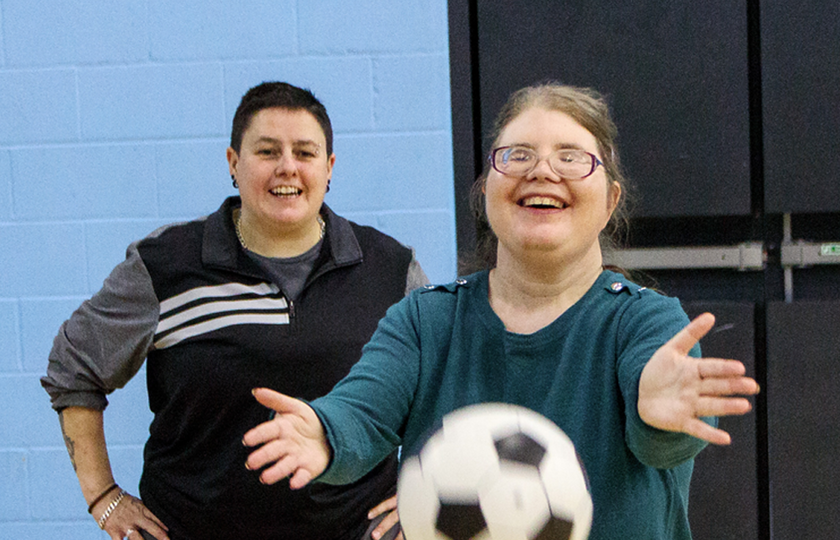Blog
Exploring meat free alternatives

What do people with a learning disability think about eating meat? Read about the findings of our study, sponsored by Quorn.
In 2018 a third of people in the UK had either given up eating meat or were looking to reduce their meat intake. We have also seen an increased availability of meat-free options in our supermarkets and food outlets, with companies like Greggs and KFC, introducing successful products like a vegan sausage roll. There are many reasons people choose to reduce their meat intake, for example, the perceived health benefits, such as the reduction in certain cancers (for instance bowel cancer) that are linked to a diet high in processed and/or red meat. Environmental concerns regarding meat are increasing because of popular mainstream films on Netflix like Cowspiracy. Many people choose not to eat meat due to concerns about animal welfare.
What do people with a learning disability think about eating meat?
Quorn funded us to research this question (but they did not interfere or influence our research) to find out what people with a learning disability thought about eating meat. Within our research we found that most people with a learning disability knew very little about the topic. We spoke to 20 people with a learning disability who ate meat, and we found that:
- Almost all the people we spoke to were not aware of any ethical/environmental issues regarding eating meat. Several people said they felt bad eating meat as they did love animals but tried not to think about it.
- People who did not get support with meals and lived independently ate a diet heavy in processed meat including lots of ready meals and takeaways.
- Most people with learning disabilities who ate meat typically ate meat at every meal, (excluding breakfast - although some ate meat at every meal). People found it hard to think of a meal they ate that did not include meat (or fish).
- People were mostly unaware of some of the potential health issues of eating a diet heavy in red or processed meat, such as an increased risk of developing bowel cancer and high cholesterol.
Are there any people with a learning disability who choose not to eat meat?
We wanted to speak to people with a learning disability who had made an active choice to stop eating meat and they were hard to find. Within Choice Support we could only identify one person. Luckily, other organisations helped us to find six more.
What did we find?
Everyone we spoke to had decided to stop eating meat because they love animals and felt bad about how they are treated and slaughtered. Lily said:
“You love animals, but would you eat your own pet… sort of thing. So, it’s like... it's like, erm, more if you have a dog, why are you eating meat?
People used the internet to do their own research on this issue, and it was often seeing something on TV or online that made them consider not eating meat. Jasmine said:
“Lisa Simpson does [not eat meat] and I just don't want to eat nasty meat ‐ about animals, turned to meat”.
The people we spoke to felt that most people with learning disabilities are not aware that animals are killed for meat. They felt there is not enough easy‐read information available to make informed choices. They felt there was a need for more education and information to help people understand about being a vegetarian, but this should not be too graphic as they did not want to upset people. Gemma said:
“Without being graphic, making people aware of the fact that it's not very kind to the animals because we have to kill them to get the meat off them. You could explain to them, again without being too graphic”.
Better health was highlighted as a benefit to adopting a meat‐free diet by almost everyone, believing it to be lower in fat with fewer links to diseases (Mad Cow disease, tapeworms, cancer, and food poisoning were some of the concerns raised). Eric said:
“You can get really bad bowel cancer from it [processed meat]”.
Do we want to make everyone a vegetarian? No
Choice Support took part in this project funded by Quorn to find out how people with learning disabilities feel about a topic that is talked about a lot in the general population. Most of us know someone who doesn’t eat meat or who is trying to eat less meat for various reasons. We wanted to explore the idea that people we support, just like many people without learning disabilities, can hold ethical beliefs, including ethics surrounding food.
The project has a second part where we want to ask our staff and the people we support to take part in some fun activities. These activities would be designed to help people feel more confident about cooking some meals that do not include meat and for people to experience a range of different meals and textures.
When restrictions ease further, we will use our funding from Quorn to hold some exciting events including a “MasterChef” style competition with great prizes for the best meat-free meal. Watch this space.
You can watch and share the video made by the vegetarians with a learning disability who took part in the research about their views on eating meat: Exploring meat free alternatives?



